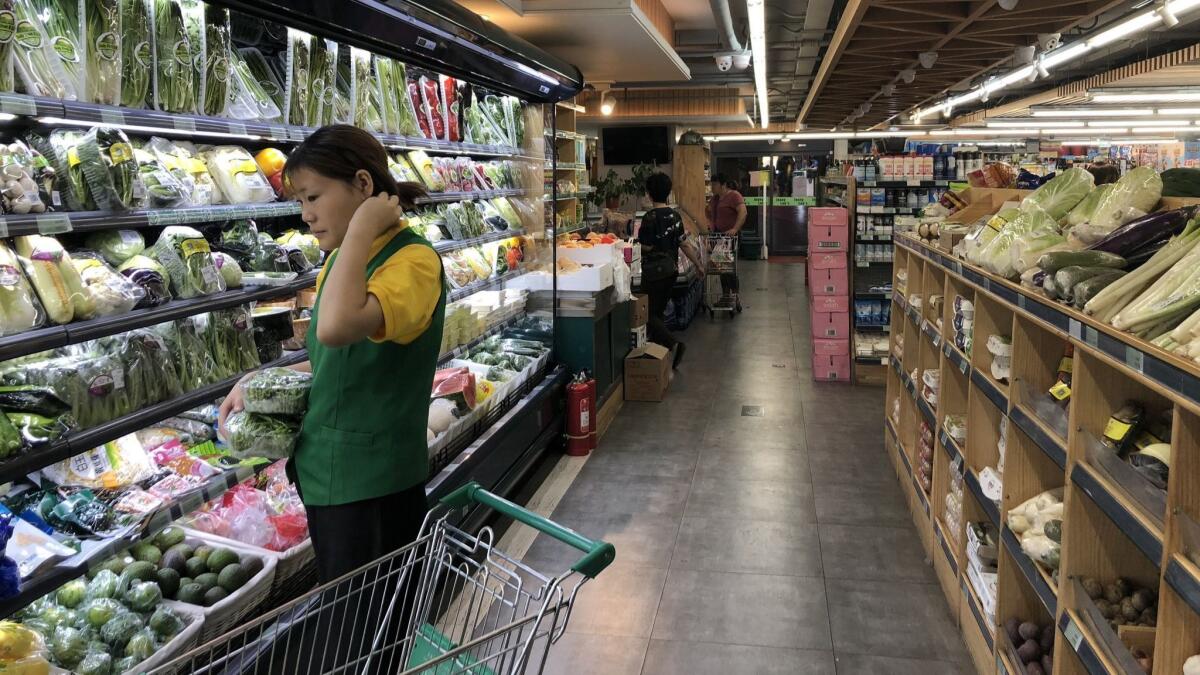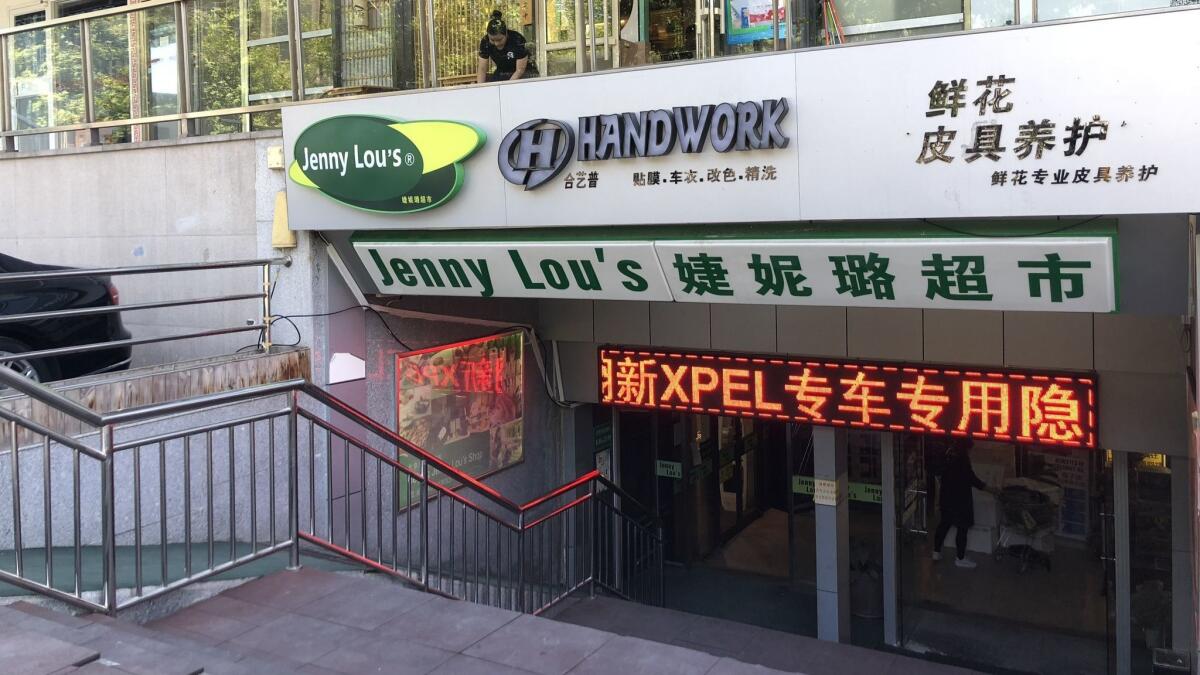For Americans in China, trade war will make the comforts of home more expensive. And that’s just the beginning

- Share via
Reporting from Beijing — The shelves of Beijing’s luxury supermarkets are crammed with familiar products that American expatriates cannot seem to do without, from breakfast cereals with just the right level of sugar and crunch to smoky salted nuts and cleaning products with the correct amount of oomph.
But Westerners — the main customers in supermarkets like Jenny Lou’s, Jenny Wang and April Gourmet — will have to pay more for a taste of home, according to Jenny Lou’s manager, Rocky Jia, with President Trump moving forward with stiff new tariffs, the latest round of which, affecting $200 billion worth of goods, was announced Monday.
China vowed to retaliate this week with tax increases on $60 billion worth of U.S. imports, including coffee, honey and chemicals — and analysts predict a long, uncertain battle ahead.
Some familiar products, such as certain Oreo cookies and Skippy peanut butter, are produced under license in China and would probably not go up in price.
But many others are imported and are likely to see steep markups, Jia said.
In supermarkets of such Beijing neighborhoods as Sanlitun, reminiscent of the U.S. or Europe with its bars, eateries, shopping malls and tree-lined streets, some Western customers said they would not be cowed by price hikes.
“I guess I would keep on buying them,” said Patricia Water, a German consultant and former diplomat who has lived in China for 15 years and shops at April Gourmet for brands she knows and trusts.
Ronald Walter, a translator from the Netherlands who’s lived in China for 21 years, said that even if his grocery bill escalates, “I guess I would still come here because it’s one of the shops that has a lot of Western products. I buy groceries, food, basically everything.”
Not everyone can afford to be so fussy. Stephanie Landes, 23, an American in Beijing, takes pains to economize. She said she only dropped into April Gourmet in Sanlitun because they had a sale on breakfast cereal.

Despite the brand loyalty of many customers, Jenny Lou’s, which imports about 30% of its stock from the U.S., is bracing for a big impact on prices and profits. The supermarket chain launched in 1988 and has 10 stores, with almost three-quarters of its products from overseas, Jia said.
Jia said imported laundry powder is more popular than well-known Western brands produced under license in southern China.
“For our customers, people really want things that come from outside China,” he said. “They believe in these brands. They believe in the quality, and also it’s habit.”
Although some Westerners say they would continue to buy their favorite American wares, Jia said that if prices rose steeply, some would probably choose similar products manufactured in Europe.
He said Jenny Lou’s income would probably decline by 10% to 20% once the impact of new tariffs hit.
Many U.S. companies doing business with China are facing similar painful choices in coming months.
“My sense in communicating with people in the Chinese and U.S. government is that both sides are hardening their positions and that neither is willing to take the kind of unilateral action that would resolve the situation,” said Jacob Parker, vice president of China operations at the U.S.-China Business Council. “The U.S. government is waiting for the Chinese government to show good-faith efforts such as announcing [that it is] implementing new liberalizations that allow China to operate more like a market economy.
“China views those liberalizations as negotiated bargaining chips that it will not give up unilaterally.”
The Trump administration wants China to stop restrictive trade practices, such as forcing foreign companies to hand over key technologies in return for access to China’s vast market. It also wants fundamental long-term changes, demanding that China operate more like a market economy, less reliant on subsidies to state firms that make it difficult for outside companies to compete.
But the more the trade war piles pressure on Chinese leader Xi Jinping, the less willing he may be to yield, because it would be perceived as humiliation and loss of face. Analysts warn the trade war will probably be protracted and painful.
While China is unable to match the U.S. dollar amount on tariffs because it imports less from the United States than it exports, it has myriad ways to make American companies, consumers and farmers feel pain.
China is an important market for U.S. cherries, for example, and China not only targeted cherries with tariffs but also imposed a new weeklong quarantine period, enough to make fruit spoil. Tariffs alone cost Northwest cherry farmers at least $86 million this summer, according to the Northwest Horticultural Council.
Imported American cars in China are subject to a 40% tariff, making it impossible for them to compete with imported European cars that face a 15% tariff.
Parker said a wide range of U.S. companies faces costly inspections, delays and regulatory scrutiny. One car manufacturer recently saw its random inspection rate jump from 2% to 100%, he said.
Closed investigations into the prices American companies were charging have been abruptly reopened. Even advertising slogans, used for years, were suddenly being questioned.
“We feel that there’s enough anecdotal evidence to indicate that there’s something of a trend happening,” Parker said.
Another risk is that omnipresent businesses such as Starbucks, McDonald’s and KFC could face a consumer boycott.
Both countries appear to believe they will win the trade war. Chinese state media commentaries say the economy is strong enough to outlast the U.S.
Trump, meanwhile, said Tuesday the U.S. might slap tariffs on an additional $267 billion in Chinese goods.
“We don’t want to do it, but we probably — we’ll have no choice,” he said.
Chinese Commerce Ministry spokesman Gao Feng said Thursday that the U.S., seeking to make China a scapegoat for its own problems, had started a trade war that would undermine world trade and harm its trading partners.
He said China would pursue a range of measures in retaliation, without detailing what would be done apart from raising tariffs.
The Trump administration has unveiled a $12-billion assistance package for U.S. farmers affected by the trade war, but some of those farmers fear it will fall short.
China, a major market for U.S. soybeans, has plans to boost domestic soy production and import beans from Brazil, Poland and Argentina.
A possible long-term effect of the trade war may be China’s increasing determination to also boost its production in high-tech products such as superconductors.
Parker said that in that sense, damage to U.S. companies had already been done. “There’s a significant concern by many in China’s government that the United States is able to control and hold hostage key links in the supply chain and that only the development of domestic industry and diversifying away from America’s products will allow China’s supply chains to be safe going forward.”
He said that members of the business council shared Trump’s concerns, but do not support tariffs. Instead, they believe the administration should pursue grievances though the World Trade Organization and other multilateral bodies alongside allies in Europe and elsewhere.
Twitter: @RobynDixon_LAT
More to Read
Sign up for Essential California
The most important California stories and recommendations in your inbox every morning.
You may occasionally receive promotional content from the Los Angeles Times.










